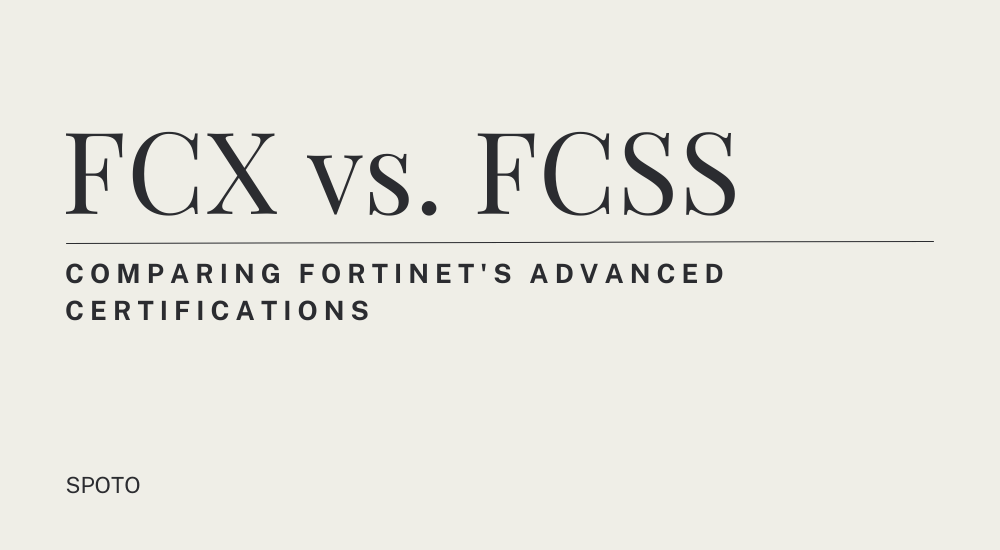TRUSTED BY THE SMARTEST TEAMS IN THE WORLD FOR CERTIFIED CANDIDATES
SPOTO Blogs
Useful learning materials to become certified IT personnel
-
- 1413
- circle
- 2025-03-07 15:34
-
- 848
- circle
- 2025-03-06 11:48
-
- 1271
- circle
- 2025-03-06 11:12
-
- 1273
- circle
- 2025-03-05 15:45
-
- 1520
- circle
- 2025-03-05 15:10
-
- 1548
- circle
- 2025-03-04 15:59
-
- 1489
- circle
- 2025-03-04 15:38
-
- 1864
- circle
- 2025-03-03 16:15
-
- 1393
- circle
- 2025-03-03 11:14
TRUSTED BY THE SMARTEST TEAMS IN THE WORLD FOR CERTIFIED CANDIDATES
SPOTO Blogs
Useful learning materials to become certified IT personnel
-
- 1413
- circle
- 2025-03-07 15:34
In the ever-evolving world of networking and communications, professionals are constantly seeking to enhance their skills and credentials to stay ahead of the curve. Two highly regarded certifications in the Cisco ecosystem are the Cisco Certified Internetwork Expert (CCIE) Collaboration and the Cisco Certified Design Expert (CCDE). Both are esteemed for their rigorous requirements and the expertise they signify, but they cater to different aspects of the networking field. This article delves into the distinctions between CCIE Collaboration and CCDE, helping professionals decide which certification path aligns best with their career goals and skill sets. Overview of CCIE Collaboration The CCIE Collaboration certification is a prestigious credential that validates an individual's expertise in designing, implementing, and troubleshooting complex collaboration solutions. Collaboration technologies encompass a wide range of communication tools and platforms, including voice, video, messaging, and conferencing systems. The CCIE Collaboration certification is particularly sought after by professionals who work with Cisco's collaboration portfolio, such as network engineers, voice engineers, and collaboration architects. To achieve the CCIE Collaboration certification, candidates must demonstrate a deep understanding of Cisco's collaboration technologies and solutions. The certification process involves passing a written exam and a hands-on lab exam. The written exam tests theoretical knowledge and design concepts, while the lab exam assesses real-world implementation and troubleshooting skills. Key Benefits of CCIE Collaboration: Industry Recognition: The CCIE certification is globally recognized as a mark of excellence in networking. Holding a CCIE Collaboration certification can open doors to high-level job opportunities and professional respect. Advanced Skill Set: Achieving this certification requires mastering complex collaboration technologies, making CCIE Collaboration holders highly skilled in their field. Career Advancement: Many organizations prioritize hiring or promoting individuals with CCIE certifications due to their proven expertise. Overview of CCDE The Cisco Certified Design Expert (CCDE) certification is geared towards network design professionals who possess extensive experience in designing large-scale, complex network infrastructures. Unlike the CCIE certifications, which focus on implementation and troubleshooting, the CCDE emphasizes design principles, methodologies, and best practices. It is ideal for network architects, senior consultants, and technical leaders who are responsible for designing and overseeing the deployment of network solutions. Earning the CCDE certification involves passing a written exam and submitting a design case study for evaluation. The written exam covers advanced design concepts, network architecture, and emerging technologies. The design case study requires candidates to demonstrate their ability to design a comprehensive network solution based on a set of complex business and technical requirements. Key Benefits of CCDE: Elite Credential: The CCDE is one of the most prestigious design-focused certifications in the networking industry, distinguishing holders as top-tier network design experts. Holistic Design Skills: CCDE certification holders possess a broad understanding of network design principles and can apply this knowledge to create robust, scalable, and secure network infrastructures. Strategic Role Preparedness: The certification prepares professionals for strategic roles that involve high-level network planning and design, making them valuable assets to organizations. CCIE Collaboration vs. CCDE: Key Differences While both the CCIE Collaboration and CCDE certifications are highly respected and indicate a high level of expertise, they serve different purposes and cater to distinct professional roles. Focus Area: CCIE Collaboration: This certification is centered around collaboration technologies, including voice, video, and messaging systems. It emphasizes implementation, configuration, and troubleshooting of these systems in real-world scenarios. CCDE: The CCDE focuses on the overall design of network infrastructures, encompassing routing, switching, security, and data center technologies. It emphasizes design principles, methodologies, and strategic planning. Exam Structure: CCIE Collaboration: Candidates must pass a written exam and a hands-on lab exam. The lab exam is particularly challenging, requiring candidates to demonstrate their practical skills in a timed environment. CCDE: Candidates must pass a written exam and submit a design case study. The case study evaluation assesses a candidate's ability to design a complete network solution based on complex requirements. Career Paths: CCIE Collaboration: Ideal for professionals who work directly with collaboration technologies, such as network engineers, voice engineers, and collaboration architects. It is particularly valuable in roles that involve deploying and maintaining communication systems. CCDE: Suited for network architects, senior consultants, and technical leaders who focus on designing large-scale network infrastructures. It is beneficial for those in strategic planning and high-level design roles. Choosing the Right Path Deciding between the CCIE Collaboration and CCDE certification paths depends on your career goals, current skill set, and professional interests. Here are some factors to consider: 1. Job Role and Responsibilities: If your primary role involves working with collaboration technologies and you enjoy hands-on implementation and troubleshooting, the CCIE Collaboration path may be more appropriate. If you are a network designer or architect responsible for planning and designing large-scale network infrastructures, the CCDE path would be more aligned with your professional focus. 2. Skill Set and Interests: Consider your existing skill set and areas of expertise. If you have a strong background in collaboration technologies and enjoy working with communication systems, CCIE Collaboration may be the better choice. If you have a broad understanding of network design principles and enjoy the strategic aspects of network planning, the CCDE may be more suitable. 3. Career Goals: Think about your long-term career aspirations. If you aim to specialize in collaboration technologies and seek advanced roles in this field, CCIE Collaboration can provide the necessary credentials. If your career goals involve moving into high-level design and strategic planning roles, the CCDE certification can offer the expertise and recognition you need. 4. Industry Demand: Assess the demand for collaboration technology experts and network designers in your industry or region. Understanding the job market can help you make an informed decision about which certification will provide the best career opportunities. 5. Personal Preferences: Consider your personal preferences for learning and certification processes. The CCIE Collaboration lab exam is known for its intensity and hands-on focus, while the CCDE design case study requires a comprehensive design approach. Choose the path that aligns with your preferred learning style and exam format. Preparation and Resources Regardless of which certification path you choose, thorough preparation is essential. Here are some resources and tips to help you get started: CCIE Collaboration Preparation: Official Cisco Resources: Utilize Cisco's official study materials, including training courses, practice labs, and exam guides. Community Forums: Engage with the CCIE Collaboration community through forums and study groups to gain insights and support from peers. Hands-On Experience: Gain practical experience by working with Cisco collaboration technologies in real-world environments. CCDE Preparation: Design Experience: Accumulate extensive design experience by working on large-scale network projects. Study Materials: Use Cisco's recommended study resources, including design guides, whitepapers, and case studies. Mentorship: Seek mentorship from experienced CCDE holders to gain valuable insights and guidance throughout the certification process. Conclusion Both the CCIE Collaboration and CCDE certifications offer significant benefits and are highly regarded in the networking industry. Choosing the right path depends on your career goals, skill set, and professional interests. By understanding the focus areas, exam structures, and career paths associated with each certification, you can make an informed decision that aligns with your aspirations and helps advance your career in the dynamic field of networking and communications. -
- 848
- circle
- 2025-03-06 11:48
Table of ContentsWhat Is CompTIA Network+ Certification?Benefits of CompTIA Network+ CertificationCompTIA Network+ Exam OverviewWho Should Take the CompTIA Network+ Certification?How to Prepare for the CompTIA Network+ ExamCareer Opportunities with CompTIA Network+Conclusion In today's digital world, networking is the backbone of communication and data transfer. Whether you are an aspiring IT professional or looking to enhance your networking skills, earning a certification can significantly boost your career. One of the most recognized networking certifications is the CompTIA Network+ certification. This guide will walk you through everything you need to know about the CompTIA Network+ certification, including its benefits, exam details, and career opportunities. What Is CompTIA Network+ Certification? CompTIA Network+ is a vendor-neutral certification that validates an individual's ability to design, manage, and troubleshoot wired and wireless networks. Offered by CompTIA (Computing Technology Industry Association), this certification covers fundamental networking concepts essential for IT professionals. Unlike vendor-specific certifications (such as Cisco's CCNA), CompTIA Network+ provides a broad understanding of networking principles, making it an excellent choice for those looking to work with various networking technologies and environments. Benefits of CompTIA Network+ Certification 1. Industry Recognition CompTIA Network+ is globally recognized and respected by employers in various industries, including government agencies, educational institutions, and private enterprises. 2. Vendor-Neutral Certification Since it is not tied to a specific vendor, the knowledge gained can be applied to multiple networking environments, making you a versatile IT professional. 3. Career Advancement Earning the Network+ certification can open doors to various job opportunities, including network administrator, network technician, and IT support specialist roles. 4. Foundation for Advanced Certifications Network+ serves as a stepping stone for more advanced certifications, such as CompTIA Security+, and even cybersecurity-focused certifications like CISSP. 5. Increased Earning Potential Certified professionals often command higher salaries compared to non-certified peers. According to various IT salary surveys, Network+ certified professionals earn competitive salaries in the industry. CompTIA Network+ Exam Overview 1. Exam Code The latest version of the exam is CompTIA Network+ (N10-009), which replaces the previous N10-008 version. 2. Exam Objectives The exam tests candidates on five key domains: Networking Fundamentals: Covers OSI and TCP/IP models, networking protocols, and concepts. Network Implementations: Focuses on configuring and deploying networking devices and technologies. Network Operations: Examines network monitoring, business continuity, and policies. Network Security: Covers security concepts related to networks, including threats, vulnerabilities, and mitigation techniques. Network Troubleshooting: Tests the ability to diagnose and resolve network issues effectively. Who Should Take the CompTIA Network+ Certification? Aspiring IT Professionals: Individuals looking to start a career in networking or IT support. Help Desk Technicians: Professionals who want to move into more specialized networking roles. Network Administrators: Those looking to validate their skills and advance in their careers. Cybersecurity Enthusiasts: Individuals who want to build a strong foundation in networking before pursuing security certifications. How to Prepare for the CompTIA Network+ Exam 1. Study Materials Official CompTIA Network+ Study Guide: Covers all exam objectives in detail. Online Training Courses: Platforms like SPOTO offer comprehensive courses. Practice Tests: Taking mock exams can help gauge readiness and identify weak areas. 2. Hands-on Experience Practical experience with networking devices, routers, and switches is crucial for mastering networking concepts. 3. Join Online Communities Engaging with forums like Reddit, CompTIA's official community, and study groups can provide valuable insights and study resources. Career Opportunities with CompTIA Network+ Earning the Network+ certification can lead to various career paths, such as: Network Administrator: Responsible for maintaining and troubleshooting network systems. Network Engineer: Designs and implements network infrastructures. IT Support Specialist: Provides technical support for network-related issues. Cybersecurity Analyst: Uses networking knowledge to enhance security measures. Conclusion The CompTIA Network+ certification is an excellent starting point for anyone looking to build a successful career in networking. It provides essential networking knowledge, enhances career prospects, and serves as a foundation for more advanced certifications. Whether you are an aspiring IT professional or an experienced tech enthusiast looking to validate your skills, earning the Network+ certification can be a valuable investment in your future. -
- 1271
- circle
- 2025-03-06 11:12
Table of ContentsUnderstanding the CCIE CertificationChallenges of Pursuing CCIE Without ExperienceRecommended Path for BeginnersHow Long Does It Take to Prepare for CCIE Without Experience?Is It Worth Pursuing CCIE Without Experience?Conclusion The Cisco Certified Internetwork Expert (CCIE) certification is one of the most prestigious and challenging credentials in the networking industry. It validates an individual's ability to design, implement, troubleshoot, and manage complex networking solutions. Many aspiring IT professionals wonder: Can you pursue CCIE certification without any prior experience in networking? While it is not impossible, it is highly challenging. This article explores the requirements, challenges, and recommended steps for those considering CCIE without prior networking experience. Understanding the CCIE Certification The CCIE certification is not an entry-level credential. It is designed for professionals with deep knowledge of networking concepts and hands-on experience. The certification has several tracks, including: CCIE Enterprise Infrastructure – Focuses on large-scale enterprise networks. CCIE Security – Specializes in network security solutions. CCIE Data Center – Covers advanced data center technologies. CCIE Service Provider – Deals with service provider network architectures. CCIE Collaboration – Emphasizes voice, video, and collaboration technologies. CCIE Wireless – Focuses on wireless networking and mobility solutions. Each of these tracks requires extensive knowledge, practical experience, and problem-solving skills. Challenges of Pursuing CCIE Without Experience Complexity of Concepts – CCIE covers advanced networking topics that require foundational knowledge in areas like routing, switching, security, and automation. No Official Prerequisites – Cisco does not mandate prior certifications, but having CCNA and CCNP-level knowledge is essential. Lack of Hands-On Practice – Experience with real-world networking problems is crucial for the CCIE lab exam. High Failure Rate – The CCIE exam is rigorous, with many candidates requiring multiple attempts to pass. Time and Financial Commitment – Preparing for CCIE requires a significant investment of time and money, including training, lab access, and exam fees. Recommended Path for Beginners 1. Start with Networking Fundamentals Learn basic networking concepts: IP addressing, subnetting, VLANs, and routing protocols. Study Cisco's official resources, such as Cisco Networking Academy courses. 2. Earn Entry-Level Certifications CCNA (Cisco Certified Network Associate) – Provides foundational networking knowledge and is an essential stepping stone. CCNP (Cisco Certified Network Professional) – Covers more advanced networking concepts and practical configurations required for CCIE preparation. 3. Gain Hands-On Experience Set up a home lab using Cisco Packet Tracer, GNS3, or EVE-NG. Work on real-world networking tasks in a job or internship. Participate in online labs and simulations to practice configurations. Experiment with network automation tools like Python, Ansible, and Netmiko. 4. Develop Troubleshooting Skills Troubleshooting is a key part of the CCIE lab exam. Practice identifying and solving networking issues in lab environments. Join networking forums, Discord groups, and study groups to exchange knowledge and learn from others' experiences. Use Cisco's Troubleshooting Documentation and Cisco Learning Network resources. 5. Attempt the CCIE Written and Lab Exams Once confident in networking concepts, take the CCIE written exam, which serves as a prerequisite for the lab exam. Prepare intensively for the CCIE lab exam, which tests hands-on networking expertise. Take training courses from platforms like Cisco Learning Network and SPOTO. Schedule lab practice sessions in Cisco DevNet Sandbox or use a rented virtual lab. How Long Does It Take to Prepare for CCIE Without Experience? For someone starting with zero networking experience, the CCIE journey can take anywhere from 3 to 5 years. Here's a breakdown: 0-6 Months – Learn networking fundamentals and get CCNA certified. 6-12 Months – Gain hands-on experience and earn CCNP certification. 12-24 Months – Work in a networking role, practice troubleshooting, and prepare for CCIE written exam. 24-36 Months – Focus on CCIE lab preparation, simulations, and advanced configurations. 36+ Months – Attempt the CCIE lab exam and refine skills through continued practice. Is It Worth Pursuing CCIE Without Experience? Pursuing CCIE without prior networking experience is a difficult but rewarding challenge. While it is not the traditional route, it can be achieved with dedication, structured learning, and hands-on practice. However, starting with CCNA and CCNP certifications is a far more practical and effective approach. CCIE-certified professionals are highly sought after and can earn six-figure salaries. If you're passionate about networking and willing to put in the effort, CCIE can be a game-changer for your IT career. Conclusion While it is technically possible to pursue CCIE certification without prior networking experience, it is an extremely difficult path. Beginners are strongly encouraged to build a solid foundation through CCNA and CCNP certifications, gain hands-on experience, and develop troubleshooting skills before attempting CCIE. By following a structured approach, even those new to networkinINE, g can eventually achieve CCIE certification and become experts in the field. If you're just starting out, take it step by step. Master the basics, gain experience, and then aim for CCIE. The journey will be long, but the rewards are well worth it. -
- 1273
- circle
- 2025-03-05 15:45
Table of ContentsFactors Affecting Study DurationRecommended Study Duration Based on ExperienceStudy Strategies for CCNP SuccessConclusion The Cisco Certified Network Professional (CCNP) certification is a valuable credential for IT professionals looking to advance their networking careers. However, one of the most common questions among candidates is: How long should I study to pass the CCNP exam? The answer depends on various factors, including prior experience, study methods, and available preparation time. This article explores the ideal study duration for IT professionals based on different experience levels, the best study strategies, and tips to ensure exam success. Factors Affecting Study Duration The amount of time required to prepare for the CCNP exam varies based on several key factors: Prior Networking Experience – Candidates with hands-on experience in networking may require less study time compared to those new to Cisco technologies. Familiarity with Cisco Devices and Concepts – A strong foundation in Cisco networking, including CCNA-level knowledge, can reduce the preparation period. Study Schedule and Commitment – The number of study hours per day or week significantly affects the total preparation time. Learning Style – Self-paced learners may take longer than those following structured training programs. Resources Used – The effectiveness of study materials, such as books, labs, and practice exams, plays a crucial role in preparation. Recommended Study Duration Based on Experience 1. Beginners (Little to No Networking Experience) Estimated Study Time: 6–9 months If you are new to networking, a longer preparation period is necessary to build fundamental knowledge before diving into CCNP concepts. Recommended steps: Start with CCNA-level materials for a solid networking foundation. Allocate at least 10–15 hours per week to study. Use hands-on labs to gain practical experience. 2. IT Professionals with Basic Networking Knowledge Estimated Study Time: 4–6 months Those with some networking background but without CCNP-level experience should spend a moderate amount of time preparing. Recommended steps: Focus on CCNP topics while reinforcing CCNA concepts. Study 8–12 hours per week, including lab practice. Take practice exams to identify weak areas. 3. Experienced Network Engineers Estimated Study Time: 2–4 months Professionals with hands-on networking experience may need less time for preparation. Recommended steps: Allocate 6–10 hours per week for revision and lab work. Focus on complex CCNP topics and real-world implementation. Use advanced study guides and scenario-based labs. Study Strategies for CCNP Success Follow a Structured Study Plan – Set clear goals and break down topics into manageable sections. Use Official Cisco Resources – Utilize Cisco's official training materials, documentation, and whitepapers. Get Hands-on Practice – Use labs, simulators, or real hardware to reinforce theoretical knowledge. Join Online Communities – Engage in study groups, forums, and discussions to learn from others. Take Practice Exams – Regularly test your knowledge with mock exams to track progress. Stay Consistent – Studying consistently over time is more effective than last-minute cramming. Conclusion The ideal study duration for the CCNP exam varies based on experience level, study habits, and available resources. Beginners should aim for 6–9 months, while experienced professionals may require only 2–4 months of preparation. By following a structured plan, practicing hands-on labs, and using the right study materials, IT professionals can efficiently prepare for and pass the CCNP exam, taking their networking careers to the next level. -
- 1520
- circle
- 2025-03-05 15:10
Table of ContentsOverview of FCX and FCSS CertificationsFCX vs. FCSS: A Detailed ComparisonBenefits of FCX and FCSS CertificationsHow to Choose Between FCX and FCSSConclusion Fortinet offers a range of certifications designed to validate expertise in network security and cybersecurity solutions. Among its advanced certifications, the Fortinet Certified Expert (FCX) and Fortinet Certified Solution Specialist (FCSS) stand out for professionals looking to deepen their technical knowledge and career prospects. While both certifications are highly regarded, they serve different purposes and cater to distinct career paths. FCX is Fortinet's highest certification level, demonstrating mastery of complex security solutions. FCSS, on the other hand, is a specialization certification focusing on specific areas within Fortinet's security ecosystem, such as SD-WAN, cloud security, or network access. This article explores the differences between FCX and FCSS, their requirements, benefits, and which one may be the best fit for your career goals. Overview of FCX and FCSS Certifications Fortinet's advanced certification tracks include: Fortinet Certified Expert (FCX) – The highest level of Fortinet certification, demonstrating comprehensive expertise across Fortinet's security solutions. Fortinet Certified Solution Specialist (FCSS) – A specialist certification focused on in-depth knowledge of specific Fortinet technologies, such as SD-WAN or cloud security. Both certifications require extensive knowledge and practical experience with Fortinet products but differ in scope and specialization. FCX vs. FCSS: A Detailed Comparison 1. Fortinet Certified Expert (FCX) The FCX certification is Fortinet's most advanced credential, designed for cybersecurity professionals responsible for designing, deploying, and troubleshooting complex security infrastructures using Fortinet technologies. It covers a broad range of security concepts, including firewalls, advanced threat protection, and secure access solutions. Key Skills Validated: Mastery of Fortinet's security solutions, including FortiGate, FortiManager, and FortiAnalyzer Designing and implementing advanced security architectures Network security troubleshooting and optimization Threat detection, mitigation, and response strategies Exam Format: Written Exam: Tests deep theoretical knowledge of Fortinet's security technologies. Practical Exam: An intensive hands-on lab exam where candidates demonstrate their ability to deploy and troubleshoot complex security solutions. Recommended Experience: At least 5+ years of experience in network security, with extensive hands-on knowledge of Fortinet products. 2. Fortinet Certified Solution Specialist (FCSS) The FCSS certification is designed for professionals specializing in specific Fortinet technologies. Rather than covering all aspects of Fortinet security, FCSS certifications focus on distinct areas such as SD-WAN, cloud security, or secure access. Key Skills Validated: In-depth knowledge of a specific Fortinet security solution (e.g., SD-WAN, endpoint security, cloud security) Configuring and managing Fortinet security products in a specialized domain Troubleshooting and optimizing Fortinet solutions for maximum performance and security Understanding industry best practices for deploying Fortinet security technologies Exam Format: Written Exam: Covers theoretical and practical knowledge related to a specific Fortinet solution. Recommended Experience: 2-3 years of experience working with Fortinet security technologies in the chosen specialization. Benefits of FCX and FCSS Certifications 1. Career Growth FCX: Ideal for senior-level security architects, consultants, and network engineers looking to validate their mastery of Fortinet solutions. FCSS: Suitable for security professionals aiming to specialize in a specific Fortinet technology and advance within that domain. 2. Industry Recognition Both FCX and FCSS are globally recognized, demonstrating expertise in Fortinet's cybersecurity solutions. 3. Increased Earning Potential Fortinet-certified professionals often command higher salaries due to their specialized knowledge and expertise in network security. 4. Specialized vs. Broad Expertise FCX: Provides a broad and deep understanding of all Fortinet technologies. FCSS: Allows professionals to gain expert-level knowledge in a specific area, making them valuable for specialized roles. How to Choose Between FCX and FCSS Consider Your Career Goals: If you want to be a Fortinet security architect or consultant, FCX is the best choice. If you prefer to specialize in a particular Fortinet technology, FCSS is more suitable. Assess Your Experience Level: FCX requires extensive experience in Fortinet security solutions, whereas FCSS is achievable with a few years of specialization. Look at Job Market Demand: If a specific Fortinet technology (such as SD-WAN) is in high demand, FCSS in that area may be a strategic choice. Determine Your Learning Preferences: If you enjoy a broad, all-encompassing approach, FCX is a better fit. If you prefer mastering a specific technology, FCSS is ideal. Conclusion Both FCX and FCSS certifications provide significant value to cybersecurity professionals, but they serve different purposes. FCX is best suited for those seeking broad expertise in Fortinet security solutions, while FCSS is ideal for specialists focusing on a particular Fortinet technology. By choosing the right certification based on career goals and expertise level, professionals can enhance their credentials and position themselves for greater success in the cybersecurity industry. -
- 1548
- circle
- 2025-03-04 15:59
Table of ContentsOverview of CCIE EI and DevNet CertificationsCCIE EI vs. DevNet: A Detailed ComparisonBenefits of CCIE EI and DevNet CertificationsHow to Choose Between CCIE EI and DevNetConclusion Cisco's CCIE (Cisco Certified Internetwork Expert) and DevNet tracks are two highly respected certification paths for networking professionals. While both validate expert-level knowledge, they focus on different areas of expertise. The CCIE Enterprise Infrastructure (EI) track is designed for traditional network engineers, emphasizing advanced routing, switching, and network security. In contrast, the DevNet track is tailored for professionals specializing in network automation, software development, and programmability in Cisco environments. This article explores the key differences between CCIE EI and DevNet, their certification requirements, benefits, and how to decide which track best aligns with your career aspirations. Overview of CCIE EI and DevNet Certifications Cisco offers these two expert-level certifications to address the evolving needs of network professionals: CCIE Enterprise Infrastructure (EI) Cisco Certified DevNet Expert Both certifications are designed for experienced professionals but cater to different skill sets and career paths. CCIE EI vs. DevNet: A Detailed Comparison 1. CCIE Enterprise Infrastructure (EI) The CCIE EI certification is ideal for networking professionals who focus on designing, deploying, and troubleshooting complex enterprise networks. It covers a wide range of networking topics, including advanced routing, switching, SD-WAN, and security. Key Skills Validated: Network design and implementation for large-scale enterprises Advanced routing and switching technologies Network security and high availability Software-Defined Networking (SDN) with Cisco DNA Center Troubleshooting and optimizing enterprise networks Exam Format: Written Exam (350-401 ENCOR): Covers core enterprise networking technologies. Lab Exam: A hands-on test focused on configuring and troubleshooting complex network scenarios. Recommended Experience: At least 5-7 years of hands-on experience with enterprise networking and Cisco technologies. 2. Cisco Certified DevNet Expert The DevNet Expert certification is designed for professionals who specialize in network automation, software development, and DevOps within Cisco environments. This certification emphasizes skills in programming, APIs, and automation tools. Key Skills Validated: Network automation and programmability using Python Cisco APIs and automation tools (NetConf, RestConf, YANG, and Ansible) DevOps methodologies and CI/CD pipelines Secure software development and API security Cloud and edge computing integration Exam Format: Written Exam (350-901 DEVCOR): Covers core software development and automation concepts. Lab Exam: An 8-hour practical exam testing automation and programmability in Cisco environments. Recommended Experience: At least 5 years of experience in software development, network automation, or a combination of both. Benefits of CCIE EI and DevNet Certifications 1. Career Growth CCIE EI: Leads to roles such as Network Architect, Senior Network Engineer, and IT Infrastructure Manager. DevNet Expert: Opens doors to positions like Network Automation Engineer, DevOps Engineer, and Software-Defined Networking Specialist. 2. Industry Recognition Both certifications are highly regarded, demonstrating expertise in their respective fields and increasing professional credibility. 3. Higher Earning Potential Professionals with expert-level Cisco certifications often command higher salaries due to their specialized skills and demand in the industry. 4. Future-Proofing Your Career CCIE EI ensures deep expertise in traditional and modern networking technologies. DevNet Expert aligns with the growing trend of network automation and software-defined networking. How to Choose Between CCIE EI and DevNet Consider Your Background: If you have a strong foundation in traditional networking, CCIE EI may be the best choice. If you enjoy coding and automation, DevNet is a better fit. Evaluate Your Career Goals: If you want to become a network architect, CCIE EI is ideal. If you aspire to be a network automation engineer, DevNet is the way to go. Look at Industry Trends: Network automation is becoming increasingly important, making the DevNet track a valuable asset for future-proofing your skills. Assess Learning Preferences: CCIE EI focuses on deep networking concepts, while DevNet emphasizes coding and automation. Conclusion Both CCIE EI and DevNet Expert certifications offer tremendous career opportunities. Choosing the right path depends on your skills, interests, and career goals. Whether you prefer mastering enterprise networking or pioneering network automation, Cisco provides certification options to help you achieve your professional aspirations. -
- 1489
- circle
- 2025-03-04 15:38
Table of ContentsOverview of AWS Specialty CertificationsAWS Specialty Certifications BreakdownBenefits of AWS Specialty CertificationsHow to Prepare for AWS Specialty CertificationsConclusion Amazon Web Services (AWS) has established itself as a leader in cloud computing, offering a wide range of certifications tailored to different expertise levels. Among these, the AWS Specialty Level Certifications stand out for their focus on advanced, niche domains within the AWS ecosystem. These certifications are designed for professionals with deep technical knowledge and experience in specific areas such as security, networking, and machine learning. This article explores the different AWS Specialty Certifications, their requirements, benefits, and tips for earning them. Overview of AWS Specialty Certifications AWS offers three Specialty certifications, each catering to a specific area of expertise: AWS Certified Advanced Networking – Specialty AWS Certified Security – Specialty AWS Certified Machine Learning – Specialty Each certification validates an individual's ability to design, implement, and manage AWS solutions in the respective domain. AWS Specialty Certifications Breakdown 1. AWS Certified Advanced Networking – Specialty This certification is ideal for network engineers and professionals responsible for implementing and managing AWS and hybrid IT network architectures. It tests an individual's ability to design and maintain scalable and secure networks on AWS. Key Skills Validated: Designing and implementing AWS hybrid IT architectures Automating AWS networking tasks Implementing security best practices Troubleshooting networking issues Recommended Experience: Individuals who perform complex networking tasks with five years of hands-on experience architecting and implementing network solutions. 2. AWS Certified Security – Specialty Security remains a critical aspect of cloud computing, and this certification is designed for professionals focusing on securing AWS workloads. It assesses expertise in data encryption, identity and access management (IAM), security monitoring, and incident response. Key Skills Validated: Understanding AWS security services and controls Implementing secure application architectures Managing security incident responses Designing security monitoring and logging solutions Recommended Experience: Five years of IT security experience, with at least two years of hands-on AWS security experience. 3. AWS Certified Machine Learning – Specialty As machine learning (ML) becomes a fundamental part of business strategy, AWS provides this certification for professionals working with ML and AI services. Key Skills Validated: Building, training, tuning, and deploying ML models on AWS Identifying appropriate ML solutions for business challenges Implementing best practices for data preparation and feature engineering Optimizing ML models for performance and cost-effectiveness Recommended Experience: One to two years of hands-on experience with AWS ML services and a solid background in ML frameworks and algorithms. Benefits of AWS Specialty Certifications 1. Career Advancement Holding an AWS Specialty certification demonstrates expertise in a specific domain, making professionals more competitive in the job market and increasing their earning potential. 2. Industry Recognition AWS certifications are globally recognized, providing credibility and validation of an individual's skills and knowledge. 3. Expanded Job Opportunities AWS Specialty certifications open doors to specialized roles such as Security Architect, Machine Learning Engineer, and Network Engineer. 4. Staying Ahead of Technological Trends Earning a specialty certification ensures that professionals stay updated with the latest AWS advancements and best practices. How to Prepare for AWS Specialty Certifications Understand the Exam Guide: AWS provides an official exam guide detailing the domains and key topics covered. Gain Hands-on Experience: Practical experience with AWS services is crucial for success. Take Training Courses: AWS and platforms like SPOTO offer training courses tailored for each specialty certification. Use AWS Whitepapers and Documentation: These resources provide deep insights into AWS best practices. Practice with Sample Questions: Taking practice exams helps identify areas of improvement. Join AWS Communities: Engaging with AWS forums and study groups can provide valuable insights and support. Conclusion AWS Specialty Certifications are an excellent way for professionals to validate their expertise in niche areas of AWS. Whether it's security, networking, or machine learning, these certifications provide a competitive edge and enhance career growth. With thorough preparation and hands-on experience, candidates can achieve AWS Specialty certifications and unlock new career opportunities in the cloud computing industry. -
- 1864
- circle
- 2025-03-03 16:15
The CCIE (Cisco Certified Internetwork Expert) is one of the most challenging and respected networking certifications in the world. Earning it in 2025 means proving your expertise in designing, implementing, and troubleshooting complex network infrastructures. But before you jump into the CCIE journey, there are essential steps you must take to maximize your chances of success. If you're serious about passing the CCIE, here are 9 things you must do before attempting the exam—no excuses, just results! 1. Choose the Right CCIE Track for Your Career Cisco offers multiple CCIE tracks, including: CCIE Enterprise Infrastructure CCIE Security CCIE Data Center CCIE Collaboration CCIE Service Provider CCIE Wireless CCIE DevNet Each track requires different skills and knowledge, so choose the one that aligns with your career goals and expertise. Don't waste time studying for a track that won't advance your career. 2. Build a Strong CCNP-Level Foundation Before tackling CCIE, you need CCNP-level expertise. The CCNP (Cisco Certified Network Professional) certification ensures you understand advanced networking concepts and configurations, which form the foundation of CCIE-level knowledge. If you have not already earned your CCNP, it is highly recommended that you do so before starting CCIE studies. CCNP covers essential routing, switching, security, and automation topics that are critical for success in the CCIE exam. Additionally, real-world experience in network configuration and troubleshooting will significantly improve your understanding of complex CCIE lab scenarios. Skipping CCNP-level knowledge will set you up for failure in CCIE. 3. Understand the CCIE Exam Format and Blueprint Cisco's CCIE exam consists of: The Written Exam (Core Exam) – A 120-minute test covering theoretical and conceptual knowledge. The Lab Exam – An 8-hour hands-on exam that tests your ability to design, deploy, optimize, and troubleshoot complex networks. Before starting your preparation, review the CCIE blueprint for your track. Understanding the exam objectives will help you structure your study plan effectively. The blueprint also highlights the technologies and concepts that are heavily tested, allowing you to prioritize key areas of study. 4. Set Up a Home Lab or Use Virtual Labs Hands-on practice is essential for CCIE. You must build, configure, and troubleshoot real-world network scenarios. Your home lab setup should include: Cisco Routers & Switches (physical or virtual) EVE-NG, GNS3, or Cisco CML for virtual labs Cisco IOS images for lab simulations Automated tools for network configuration If a home lab is not an option, use Cisco DevNet labs or CCIE boot camp environments. 5. Master Time Management and Troubleshooting Techniques Time is your biggest enemy in the CCIE Lab Exam. You must be able to: Solve problems under time pressure. Quickly identify and troubleshoot network issues. Optimize configurations without wasting time. To improve troubleshooting speed, study Cisco's recommended troubleshooting methodology. Develop a structured approach to diagnosing and resolving network issues efficiently. Practice real-time debugging using CLI commands and focus on optimizing configurations without unnecessary steps. Building speed and accuracy in troubleshooting will be critical for passing the exam. 6. Use High-Quality Study Resources Don't waste time with outdated or low-quality materials. Instead, focus on trusted CCIE study resources: Official Cisco CCIE Books & Whitepapers SPOTO and Cisco Learning Network training CCIE practice exams and lab scenarios Cisco Documentation & Configuration Guides CCIE study materials evolve frequently, so ensure you're using the latest versions. 7. Join CCIE Study Groups and Online Communities Networking with other CCIE candidates can boost your motivation and help clarify complex topics. Join: CCIE Discord groups Cisco Learning Network forums Reddit's CCIE subreddit LinkedIn CCIE groups Engaging in study groups allows you to discuss lab strategies, share troubleshooting tips, and stay accountable. Many candidates find that participating in a study community significantly improves their understanding of difficult topics. 8. Develop a CCIE Study Plan (and Stick to It) The CCIE journey requires six to twelve months of dedicated preparation. Without a structured study plan, it is easy to lose focus or fall behind. Create a detailed study schedule that includes specific milestones, such as completing the CCIE written exam by a certain date and dedicating a set number of hours each week to lab practice. Take regular mock exams to track your progress and adjust your study plan as needed. Consistency is key. Many candidates fail due to lack of discipline, not lack of knowledge. Sticking to a well-structured plan ensures steady progress and prevents burnout before the exam. 9. Strengthen Your Mental Resilience The CCIE Lab Exam has a high failure rate, but failure is part of the learning process. Many CCIEs fail on the first attempt but pass on the second. The exam is designed to be challenging and stressful. Staying calm under pressure is critical. Building mental resilience is just as important as mastering technical skills. Prepare for setbacks, and do not get discouraged if you struggle with practice labs. Treat every mistake as a learning opportunity. Take care of your physical and mental health, get enough rest, and avoid burnout. Staying motivated and maintaining confidence will improve your ability to perform under exam conditions. Final Thoughts Becoming CCIE certified in 2025 is achievable—but only if you prepare strategically. Follow these 9 essential steps, stay consistent, and commit to real hands-on practice. There are no shortcuts to CCIE success—just dedication, preparation, and results. Are you ready to take the first step? -
- 1393
- circle
- 2025-03-03 11:14
Table of ContentsThe Role of AI in Modern CertificationsCisco's CCNA Embraces AI-Powered NetworkingPMP Certification: AI-Enhanced Project ManagementAWS AI Certification: Preparing Cloud Professionals for the AI EraThe Future of AI-Integrated Certifications The rapid evolution of Artificial Intelligence (AI) is reshaping industries, redefining job roles, and transforming the way professionals are trained and certified. As AI continues to revolutionize IT, project management, and cloud computing, leading certification bodies are adapting their curricula to ensure professionals remain competitive in an AI-driven world. Three major certifications—Cisco's CCNA, PMI's PMP, and AWS's AI credentials—are at the forefront of this transformation, incorporating AI competencies into their programs. This shift ensures that professionals not only understand AI but can also leverage it effectively in their respective domains. The Role of AI in Modern Certifications AI is no longer a futuristic concept—it is embedded in everyday business operations, optimizing processes, automating tasks, and enhancing decision-making. As a result, certification programs that traditionally focused on networking, project management, and cloud computing are evolving to include AI and machine learning (ML) concepts. This integration is essential for professionals who want to stay relevant in a rapidly changing technological landscape. Cisco's CCNA Embraces AI-Powered Networking Cisco's Certified Network Associate (CCNA) certification has long been a cornerstone for IT networking professionals. Recognizing the growing impact of AI, Cisco has updated the CCNA curriculum to include AI-related topics. Starting August 20, 2024, the 200-301 CCNA exam will cover Generative AI, Cloud Network Management, and Machine Learning, reflecting the increasing reliance on AI for network optimization and automation. These changes align with the broader industry trend of leveraging AI-driven solutions to improve efficiency and security in networking. Key updates in the revised CCNA certification include: AI for Network Automation: AI-driven automation tools are now crucial for managing large-scale networks. The new CCNA curriculum emphasizes AI's role in troubleshooting, monitoring, and predictive analysis. Machine Learning in Networking: Understanding ML models and how they enhance network performance and security. Cloud-Based AI Integration: Learning how AI-powered tools integrate with cloud-based networking platforms. By incorporating AI, Cisco is ensuring that network professionals are not only skilled in traditional networking but also capable of leveraging AI tools to streamline operations and enhance security. PMP Certification: AI-Enhanced Project Management The Project Management Institute (PMI) is another major certification body integrating AI into its curriculum. The Project Management Professional (PMP) certification is widely regarded as the gold standard for project managers, and PMI recognizes the impact of AI in task prioritization, risk management, and resource allocation. How AI is reshaping project management: Automated Task Management: AI-powered project management tools help automate routine tasks, enabling project managers to focus on strategic decision-making. Predictive Analytics: AI-driven insights help managers forecast project risks and take proactive measures. Enhanced Decision-Making: AI assists in prioritizing tasks based on historical data and real-time project progress. By integrating AI into the PMP certification, PMI ensures that project managers are equipped with the necessary skills to leverage AI for improved efficiency and productivity. AWS AI Certification: Preparing Cloud Professionals for the AI Era Amazon Web Services (AWS) has recognized the need for AI expertise in cloud computing and has launched the AWS Certified AI Practitioner certification. This credential validates foundational knowledge in AI, ML, and Generative AI concepts, ensuring that cloud professionals can harness AI-driven capabilities effectively. The AWS AI Practitioner certification covers: Fundamentals of Al and ML Fundamentals of Generative Al Applications of Foundation Models Guidelines for Responsible Al Security, Compliance, and Governance for Al Solutions By offering AI-specific certifications, AWS is positioning cloud professionals to thrive in an industry that increasingly relies on AI to improve efficiency and security. The Future of AI-Integrated Certifications The integration of AI into certifications like CCNA, PMP, and AWS AI Practitioner reflects a broader shift toward AI competency in professional development. As AI continues to transform industries, professionals must adapt by gaining the necessary skills to work alongside AI-driven tools and platforms. What This Means for Professionals Networking Professionals: AI-driven automation and network optimization are becoming essential skills. Project Managers: AI tools for task management and predictive analytics will redefine project execution. Cloud Experts: AI-powered cloud services will be the foundation of next-generation cloud computing. Conclusion AI is not just an emerging trend—it is the future of technology, and leading certifications are evolving to ensure professionals are prepared for this new era. Cisco's CCNA, PMI's PMP, and AWS's AI credentials are pioneering this transformation by integrating AI into their certification programs. For professionals seeking to stay ahead in their careers, gaining AI expertise through these certifications is not just an option—it is a necessity. As AI continues to advance, certifications will keep evolving, reinforcing the importance of lifelong learning. The AI-driven certification revolution is here, and those who embrace it will be the leaders of tomorrow's workforce.














